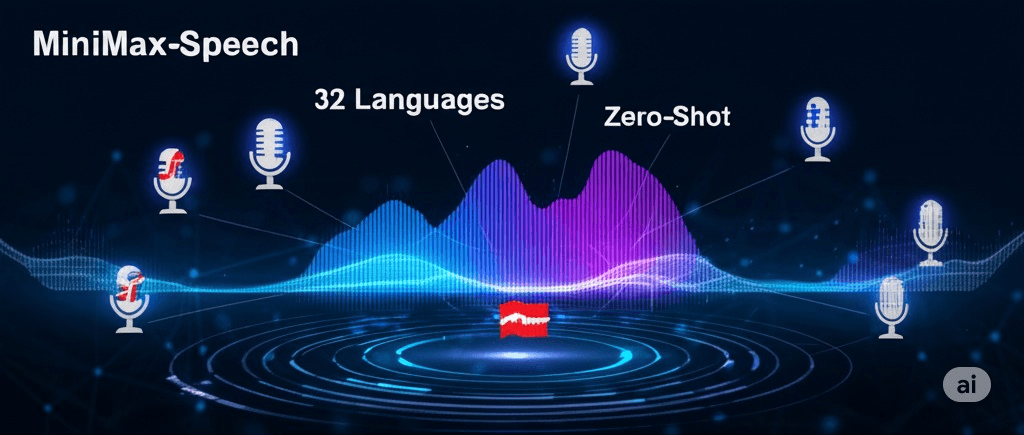MiniMax-Speech: Advanced Zero-Shot Text-to-Speech Technology
Overview
MiniMax-Speech represents a breakthrough in Text-to-Speech (TTS) technology, introducing an innovative autoregressive Transformer-based model that excels at intrinsic zero-shot voice cloning. Unlike traditional TTS systems that require paired text-audio examples, MiniMax-Speech can generate high-quality speech in any voice using only a short, untranscribed audio reference.
Key Innovations
1. Learnable Speaker Encoder
The cornerstone of MiniMax-Speech is its learnable speaker encoder, which:
- Extracts timbre features directly from reference audio without requiring transcription
- Is trained jointly with the autoregressive model (not pre-trained separately)
- Supports all 32 languages in the training dataset
- Enables true zero-shot voice cloning capabilities
2. Flow-VAE Architecture
MiniMax-Speech introduces Flow-VAE, a novel hybrid approach that:
- Combines Variational Autoencoders (VAE) with flow models
- Enhances information representation power beyond traditional mel-spectrograms
- Improves both audio quality and speaker similarity through end-to-end training
System Architecture
Loading diagram...
Component Breakdown
Speaker Encoder
- Input: Variable-length audio segments (reference voice)
- Output: Fixed-size conditional vector capturing speaker identity
- Key Feature: No transcription required, enabling cross-lingual synthesis
Autoregressive Transformer
- Architecture: Standard Transformer with causal attention
- Token Rate: 25 audio tokens per second
- Tokenization: Encoder-VQ-Decoder with CTC supervision
Flow-VAE Decoder
- Innovation: Replaces traditional mel-spectrogram generation
- Advantage: Higher fidelity through continuous latent features
- Training: Joint optimization with KL divergence constraint
Voice Cloning Paradigms
MiniMax-Speech supports two distinct voice cloning approaches:
Loading diagram...
Zero-Shot Voice Cloning (Primary Mode)
- Input: Only untranscribed reference audio
- Advantage: Maximum flexibility and naturalness
- Performance: Superior intelligibility (lower WER)
- Use Case: Cross-lingual synthesis, diverse prosodic generation
One-Shot Voice Cloning (Enhancement Mode)
- Input: Reference audio + paired text-audio example
- Advantage: Higher speaker similarity scores
- Trade-off: Slightly reduced naturalness due to prosodic constraints
Performance Achievements
Objective Metrics
On the SeedTTS evaluation dataset:
| Model | Method | WER (Chinese) ↓ | SIM (Chinese) ↑ | WER (English) ↓ | SIM (English) ↑ |
|---|---|---|---|---|---|
| MiniMax-Speech | Zero-shot | 0.83 | 0.783 | 1.65 | 0.692 |
| MiniMax-Speech | One-shot | 0.99 | 0.799 | 1.90 | 0.738 |
| Seed-TTS | One-shot | 1.12 | 0.796 | 2.25 | 0.762 |
| Ground Truth | - | 1.25 | 0.750 | 2.14 | 0.730 |
Subjective Evaluation
- #1 Position on Artificial Arena TTS leaderboard
- ELO Score: 1153 (leading competitor)
- User Preference: Consistently preferred over OpenAI, ElevenLabs, Google, and Microsoft models
Multilingual Capabilities
MiniMax-Speech supports 32 languages with robust cross-lingual synthesis:
Loading diagram...
Cross-lingual Synthesis Results
Testing Chinese speakers generating speech in other languages:
| Target Language | Zero-Shot WER ↓ | One-Shot WER ↓ | Zero-Shot SIM ↑ | One-Shot SIM ↑ |
|---|---|---|---|---|
| Vietnamese | 0.659 | 1.788 | 0.692 | 0.725 |
| Arabic | 1.446 | 2.649 | 0.619 | 0.632 |
| Czech | 2.823 | 5.096 | 0.605 | 0.648 |
| Thai | 2.826 | 4.107 | 0.729 | 0.748 |
Technical Deep Dive
Flow-VAE Mathematics
The Flow-VAE model optimizes the KL divergence between the learned distribution and a standard normal distribution:
L_kl = D_KL(q_φ(z̃|x) || p(z̃))
Where:
is the encoder distribution transformed by the flow modelq_φ(z̃|x)
is the standard normal distributionp(z̃)- The flow model
provides reversible transformationsf_θ
Speaker Conditioning Architecture
Loading diagram...
Advanced Extensions
1. Emotion Control via LoRA
- Method: Low-Rank Adaptation modules for discrete emotions
- Training: Emotion-specific datasets with
triplets<reference, text, target> - Advantage: Precise emotional control without modifying base model
2. Text-to-Voice (T2V) Generation
- Capability: Generate voices from natural language descriptions
- Example: "A warm, middle-aged female voice with slightly fast speech rate"
- Implementation: Combines structured attributes with open-ended descriptions
3. Professional Voice Cloning (PVC)
- Approach: Parameter-efficient fine-tuning of speaker embeddings
- Efficiency: Only optimizes conditional embedding vector
- Scalability: Supports thousands of distinct speakers without model duplication
Ablation Studies
Speaker Conditioning Methods Comparison
| Method | Cloning Mode | WER ↓ | SIM ↑ |
|---|---|---|---|
| Speaker Encoder | Zero-shot | 1.252 | 0.730 |
| Speaker Encoder | One-shot | 1.243 | 0.746 |
| SpkEmbed (Pre-trained) | Zero-shot | 1.400 | 0.746 |
| OnlyPrompt | One-shot | 1.207 | 0.726 |
Flow-VAE vs Traditional VAE
| Model | NB PESQ ↑ | WB PESQ ↑ | STOI ↑ | MS-STFT-LOSS ↓ |
|---|---|---|---|---|
| VAE | 4.27 | 4.20 | 0.993 | 0.67 |
| Flow-VAE | 4.34 | 4.30 | 0.993 | 0.62 |
Implementation Considerations
Training Data
- Scale: Multilingual dataset spanning 32 languages
- Quality Control: Dual ASR verification process
- Preprocessing: VAD-based punctuation refinement
- Consistency: Multi-speaker verification for timbre consistency
Inference Efficiency
Loading diagram...
Advantages Over Existing Solutions
Compared to Traditional TTS
- No Speaker-Specific Training: Eliminates need for hours of speaker data
- Cross-lingual Flexibility: Single model works across all supported languages
- Real-time Adaptation: Instant voice cloning from short samples
Compared to Other Zero-Shot Models
- True Zero-Shot: No transcription required for reference audio
- Superior Quality: SOTA results on objective and subjective metrics
- Extensibility: Robust foundation for downstream applications
Future Directions
The robust speaker representation framework of MiniMax-Speech opens possibilities for:
- Enhanced Controllability: Fine-grained prosodic and emotional control
- Efficiency Improvements: Faster inference and reduced computational requirements
- Specialized Applications: Domain-specific voice synthesis (education, entertainment, accessibility)
- Multimodal Integration: Vision-guided voice generation and style transfer
Conclusion
MiniMax-Speech represents a significant advancement in TTS technology, combining the flexibility of zero-shot voice cloning with state-of-the-art audio quality. Its learnable speaker encoder and Flow-VAE architecture provide a powerful foundation for diverse speech synthesis applications, achieving unprecedented performance while maintaining practical scalability and extensibility.
The model's success on public benchmarks and its innovative approach to speaker conditioning make it a compelling choice for developers and researchers working on next-generation speech synthesis systems.
